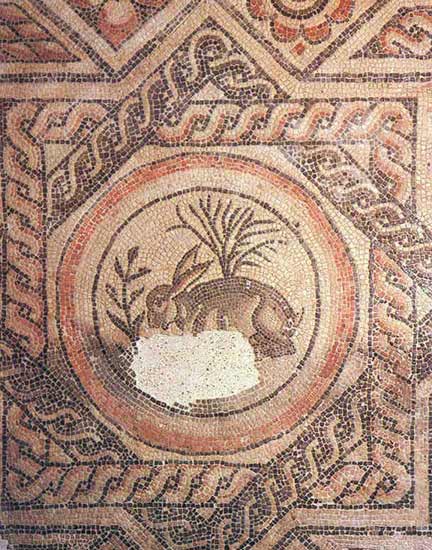Hare Floor Mosiac
4th century
Corinium School, Cirencester, Gloucestershire
Corinium Museum
Dan Chiasson’s book of poetry, Natural History (2005) is inspired by Pliny (the Elder, who wrote the original Naturalis historia) and Horace. Taking Pliny as a starting point may well be hubris, because Naturalis historia is an encyclopedic history of everything, a curiosity cabinet of words, imperfectly balanced between imagination and observation. (Pliny, less reliable than he was prolific, warns of basilisks, dragons, manticores, and the catoblepas: “its head is remarkably heavy, and it only carries it with the greatest difficulty, being always bent down towards the earth. Were it not for this circumstance, it would prove the destruction of the human race; for all who behold its eyes, fall dead upon the spot.”) Horace, in turn, wrote the Ars Poetica. I conclude that Chiasson is not easily intimidated.
What I like about Chiasson’s poems (and one reason Pliny makes a fit patron) is that they meld without apology or self-consciousness the lyric and the quotidian, the romantic and the scientific. The effect is sometimes invigorating, as in “Love Song (Sycamores)”:
Stop there. Stop now. I calculated that
the number of birds singing
on any given morning
was a function of the sycamores plus my hangover.
Sometimes the mix of slang and classics is distressingly weird. And when a poem makes me feel weird, I sit up and take closer notice than when I find it beautiful. This collection may pose as an encyclopedia, with titles like “The Sun,” “The Pigeon,” and “The Elephant,” but it confuses far more than it explicates, layering references and voices on each other until I’m sometimes not quite sure who’s speaking. Chiasson addresses one poem to himself, mentions himself by name in another, mentions or references a dozen other modern poets. This is a book of poetry you’re reading, in case you forgot. As in a museum, it’s disorienting and a little annoying when the nose hits the glass.
Yet I’m charmed by my feeling that Chiasson is, above all, teasing. This is a poet at play, a poet unafraid to stitch his own idiosyncratic collage-history of the world (one of the poems I like most is called “Made-up Myth”). That history is sometimes panoramic, sometimes intimate:
They are made of such strange dreams, bee-like dreams:
a peach orchard she never played in as a child,
where overnight the peaches never turned to stone. (“Made-up Myth”)
My favorite of all Chiasson’s poems appeared in the New Yorker, but not in Natural History, so I have obtained his permission to reproduce it here in entirety. It’s a riff on, of all things, a Roman floor mosaic, which was discovered in 1971 in Cirencester, England. (Corinium Dobunnorum was the Roman name for Cirencester, second in size only to London in 2nd century Britain.)
For a glass lagomorph, the hare sure has a lot of opinions. The poem is panoramic in both space and time, crossing years and nations the hare, buried in forgotten Corinium, did not witness. Yet to me its voice rings familiar: resigned, cynical, a tad plaintive, wry. What difference does art’s commentary make in the end, buried or re-discovered? Does it exist merely to give us what Whitman calls “the certainty of others” – the awareness of our place in the long continuum of life and history?
“Mosaic of a Hare: Corinium”
The New Yorker
Dan Chiasson
The boats pulling in, the boats pulling out, the top-hat
commerce of the “infant century,” crowds, crowds,
“the certainty of others,” the bomb
that filled the air with horsehair and the ambulance after:why wouldn’t I hide in my little glass body? I have a clover sprig
made of glass to aspire to, with my glass appetite.
I raise certain questions about art and its relation to stasis,
yet I despise the formalists as naïve and ahistorical.Here’s my problem with America: this “would be” that obliterates
all other moods, playing over and over in people’s heads,
the abstract optative that destiny works out.
I don’t have the luxury to think in terms of destiny.What nobody seems to get about me is, though you’re made of glass
it doesn’t mean you don’t have appetites: I do. Or fears: I do.
The day the darkness took the whole basilica, I was afraid;
and equally afraid the day, centures later, they switched the lights on.Let rabbits think in terms of destiny: Whitman, the great
American rabbit poet, the rabbits in the government,
the rabbits that light and the ones that snuff out the fuse,
and all their pretty rabbit children, waiting to be casserole.
Notes – “the certainty of others” is from Whitman’s “Crossing Brooklyn Ferry“. If you’re confused by the last stanza, note that hares are different from rabbits. I’m not sure, but I think the bomb refers to the assassination of the Nazi Reinhard Heydrich in 1942, who died ironically not from the blast, but from septicemia induced by horsehair and debris released from the seat of his car.


Any poet who can use “optative” both casually and meaningfully is awesome. It’s nice to see somebody with a classical sensibility getting published. In fact, I wish I had written those lines from “Love Song (Sycamores).”
This is the poem that motivated me to ask you to clarify the definition of optative!
I just discovered your blog through Jonah Lehrer’s and smiled w/ recognition. I am a neuroscientist (in-training) and artist. I posted poems of Dan Chiasson’s a few weeks ago and have Narcissus and Goldmund on my side bar as a favorite. Birds of a feather, or what?
Ted – that is a little coincidental. Now I have to try to follow your blog, too. . .!